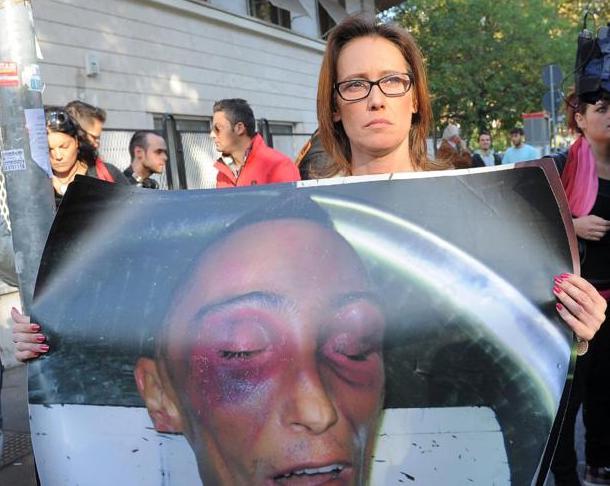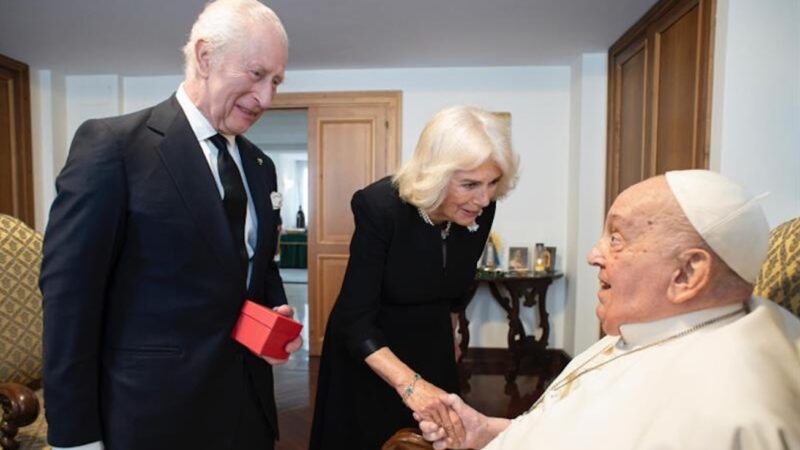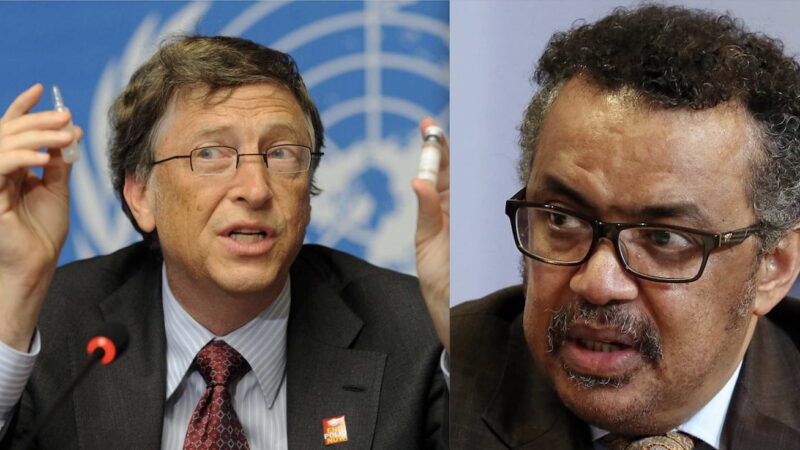Italian Pusher Died after Beaten in Barrack: Two Carabinieri Sentenced to 13 years in Prison

by Fabio Giuseppe Carlo Carisio
Versione originale in Italiano
“My thoughts go to Stefano and my parents who are not here today in the courtroom. It is the high price they have paid in recent years”, said Ilaria Cucchi who for 12 interminable years fought against the attempts to cover up the death of his brother Stefano, which occurred in the days following his arrest and his incarceration for the possession of small quantities of drugs.
The family also had to sell some housing to support the legal battle aimed at shedding light on what happened to the 31-year-old in the barrack where he was conducted for the ritual investigations and where the struggle took place which was then fatal, but long denied by the soldiers of the Italian Meritorious Corps (Carabinieri).
Today, Friday 7 May, the two carabinieri Alessio Di Bernardo and Raffaele D’Alessandro, accused of beating Stefano Cucchi, were sentenced to 13 years for unintentional murder. This is what the judges of the Court of Assizes of Appeal of Rome decided in the trial for the death of the 31-year-old, arrested on October 15, 2009 and who died seven days later at the Sandro Pertini hospital in Rome. The verdict came after five hours in the Council Chamber.
The sentence comes two days after an exactly opposite one in which two American drug addicts were convicted for the heinous voluntary murder of the deputy police sergeant Mario Cerciello Rega, confirming the difficult and dangerous activity of military investigators who risk their lives every day even in front of a young boy.
Sentence to Life Imprisonment for two Americans who killed Italian Carabiniere
But Cucchi’s case caused a sensation because the 31-year-old Roman was beaten and died after his arrest, when the protection of his safety was then in the hands of the police. The story of him therefore appears similar to that of the killing of George Floyd by the policeman Derek Chauvin which caused a hell of protests in Minneapolis in a perfect scenario of very well-designed anti-Trump political propaganda. Because the excessive use of violence, in the Italian case well hidden for posthumous death, in the American case impossible to hide for immediate death, is the common denominator of the agents’ actions.
In recent weeks, the Minneapolis court jury has issued a guilty verdict on former police officer Chauvin, for all three homicide crimes of which he was held responsible for killing 46-year-old African American Floyd last May, suffocating him after having him. handcuffed. Soon, Judge Peter Cahill will have to deliver the sentence on the size of the sentence which could be more than 20 years. The public opinion was agreed with this verdict in the opposite way on which did when a black cop in Minneapolis was sentenced for killing of a white woman…
MINNEAPOLIS HELL with Soros’ Black Lives Matter & Antifa ISIS-Allies in NED-Deep State Plot vs Trump
In the trial for the unintentional murder of Cucchi in Italy, however, the carabiniere Roberto Mandolini was also sentenced to four years for forgery and the sentence of two and a half years for the same crime confirmed for Francesco Tedesco, the soldier who with his statements shed light on the beating that took place in the Casilina barracks on the night of the arrest. For the latter, the pg Roberto Cavallone had asked for acquittal.
Tedesco is considered the super-witness of this story. The assize court had rated him as ‘credible’. “The narration” of the soldier of the Meritorious Corps on the phases immediately following Cucchi’s arrest had been confirmed by numerous elements.
Tedesco, according to the reasons for the sentence of the first instance, not only intervened to “stop the violent action”, preventing his colleagues Alessio Di Bernardo and Raffaele D’Alessandro from continuing the beating, but he had “explained the his previous silence, underlining the ‘wall’ that he had been certain had stood before him consisting of the initiatives of his superiors, aimed at not bringing out the violent action perpetrated against Cucchi, and not pursuing the will to verify what had actually happened “on the night of the arrest.
Minneapolis: Protests for «Racist System»! If Cop convicted for Murder is a Black Muslim
In the first instance, on November 14, 2019 the first Court of Assizes of Rome sentenced the two carabinieri accused of the beating, Di Bernardo and D’Alessandro, to twelve years in prison, recognizing that it was a manslaughter, as claimed by the prosecutor Giovanni Musarò. On the other hand, Francesco Tedesco had been acquitted “for not having committed the crime”. He was left with a two and a half year sentence for forgery. For the same charge, Marshal Roberto Mandolini, commander of the Appia station at the time of the events, was sentenced to three years and eight months.
THE CHRONICLE OF DEATH
On 15 October 2009 Stefano Cucchi, a 31-year-old Roman surveyor, was stopped by the carabinieri after being seen giving Emanuele Mancini some transparent packages in exchange for a banknote. Immediately taken to the barracks, he is searched and found in possession of 12 packs of various sizes of hashish (for a total of 20 grams), three packets of cocaine (of one dose each) and a medicine to treat epilepsy, a disease from which Cucchi was affected by.
Pre-trial detention is decided; the boy did not have any physical trauma before his arrest and arrival at the barracks. The next day the hearing is held for the confirmation of the arrest in prison, criticized by Luigi Manconi, director of the Anti-racial Discrimination Office at the Prime Minister’s office, since in that seat “Cucchi is attributed a foreign nationality and the condition of” homeless “, despite being legally resident in the city”. Already during the process he has difficulty walking and speaking and also shows evident bruises in the eyes; the boy talks to his father a few moments before the hearing, but does not report having been beaten.
Despite the precarious conditions, the judge sets the hearing for the trial which will have to be held a month later, and orders a pre-trial detention at the Regina Coeli prison until that date. After the hearing, Cucchi’s conditions worsen further. On October 16, at 11 pm, he is taken to the emergency room of the Fatebenefratelli hospital, where injuries and bruising of the legs, face (with fracture of the jaw), abdomen with hematuria, and chest ( with fracture of the third lumbar vertebra and coccyx). Hospitalization is then recommended, which the patient refuses, and is then returned to prison.

In the following days, due to the worsening of his conditions, Stefano Cucchi is transferred to the prison ward of the Sandro Pertini hospital, where he dies at dawn on October 22: at the time of his death he weighs only 37 kilograms. After the first hearing, the family members try several times to see, or at least know, his physical condition without success: they again have news of their relative only when a bailiff goes to their home to notify the magistrate’s authorization to perform an autopsy.
After the death of Stefano Cucchi, the prison staff denied having exercised violence on the young man and various hypotheses were formulated on the cause of death: he could have died either from the consequences of an alleged drug abuse, or because of previous physical conditions, or because of the his refusal to be admitted to the Fatebenefratelli.
The undersecretary of state Carlo Giovanardi declares that Stefano Cucchi had died only of anorexia and drug addiction, also asserting that the boy was HIV-positive. Later, regretting these false statements, he apologized to his family. In the meantime, to counter the false claims about Cucchi’s death, the family publishes some photos of the young man taken in the morgue, in which various blunt traumas are clearly visible (“swollen face, a recessed eye, a fractured jaw and damaged teeth”) and an evident state of malnutrition.
REACTIONS OF RELATIVES AND LAWYERS TO SENTENCE
“Justice works with serious, capable and honest magistrates. No reforms are needed,” said Fabio Anselmo, civil lawyer of Ilaria Cucchi. “Our thoughts go to the prosecutors Giuseppe Pignatone, Michele Prestipino and Giovanni Musarò – adds the lawyer -, after so many humiliations it is thanks to them that we are here”.
“Stefano’s mother, Mrs. Rita Calore, cried as soon as she heard of the sentence,” said the lawyer Stefano Maccioni, civil party in the trial, and lawyer of Stefano Cucchi’s parents, after the appeal sentence. “I heard her on the phone. It is a moment of great emotion. After 12 years the fight is not over yet. We are however fully satisfied with today’s decision of the Court of Appeal.”
“What a great injustice…”. comments of the carabiniere Raffaele D’Alessandro as the defender, lawyer Maria Lampitella, reports to Adnkronos.
“We thought that we could not do worse than the unjust sentence like that of first instance” says the lawyer Maria Lampitella, defender of the carabiniere Raffaele D’Alessandro, “but today we have the confirmation that justice no longer looks at the procedural data and the confirmation it is today with the acceptance of a completely inadmissible appeal that the defendants in this trial have been condemned even more seriously. Our hope is the judge of the laws, the Supreme Court, we will meet again there “.
“Before commenting on a sentence, it is necessary to read the reasons, we will see on what grounds the general extenuating circumstances against the accused carabinieri have been excluded” commented the lawyer Giosuè Bruno Naso, defender of Marshal Roberto Mandolini, sentenced for forgery to 4 years.
“I am very embittered, there is a medical report that ascertains the fact that Stefano Cucchi died as a result of the obstruction of a catheter, I believe that the manslaughter is not right” says the lawyer Antonella De Benedictis, who defends Alessio Di Bernardo, announcing the appeal to the Supreme Court.
Fabio Giuseppe Carlo Carisio
© COPYRIGHT GOSPA NEWS
no reproduction without authorization



